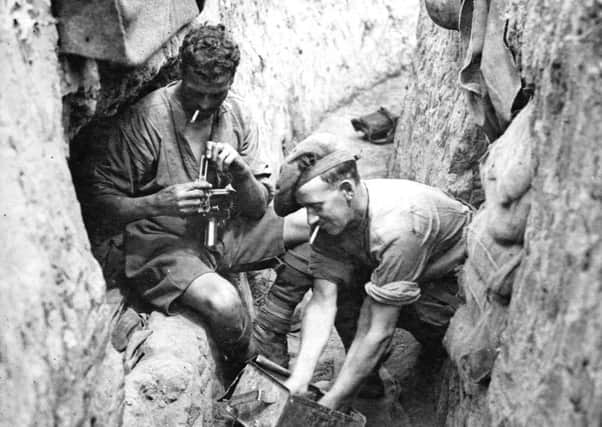Last post for the victims of Passchendaele


He spoke for tens of thousands of young men sent to their slaughter in what even the prime minister, David Lloyd George, acknowledged was one of the greatest disasters of the First World War.
By the most conservative estimates, more than a third of a million soldiers on both sides of the conflict were casualties, not just of the shells but also the rivers of mud so deep that men, horses and even tanks were swallowed whole.
Advertisement
Hide AdAdvertisement
Hide AdThe centenary on Monday of the opening assault in a battle that lasted three months but advanced just five miles will be marked with sadness and anger.
Tomorrow night, the traditional Last Post ceremony will take place at the Menin Gate memorial in Ypres, as it has every evening since 1928. This time, representatives of the nations who fought will lay wreaths under the Gate.
On Monday, Theresa May will join the descendants of soldiers, to honour their memory.
In Germany, where Passchendaele and Ypres are now no more than place names on a map, there will be no pomp. Von Hindenburg’s 220,000 victims will be little remembered.
Advertisement
Hide AdAdvertisement
Hide Ad“The single battles of the First World War are no longer part of the public memory,” said Holger Afflerbach, a German national who is professor of central European history at Leeds University.
“If people remember a battle at all, it is Verdun in 1916, which was a French-German event, or the Battle of Tannenberg in 1914, when Hindenburg was able to defeat the Russians. The rest is blurred.”
But Germans, he said, were in no less doubt than anyone else that the war had been a senseless slaughter.
“In Britain, you have the proud tradition of having won two world wars,” Prof Afflerbach said. “It makes a difference. You have something to show for it.
Advertisement
Hide AdAdvertisement
Hide Ad“Because of the traumatic experience of the Nazis, Germany is an extremely pessimistic society. There is deep, deep, suspicion towards everything military.”
To German and British soldiers alike, the anger that Sassoon immortalised in verse was all too obvious, even without the benefit of hindsight, said the professor, who is one of the editors of the Encyclopedia of the First World War.
“The fighting conditions were absolutely appalling. I know from both sides that the soldiers thought it was even worse than the Somme.
“You could drown in the mud. It went on until November and still they didn’t move forwards.
Advertisement
Hide AdAdvertisement
Hide Ad“They were unlucky with the weather, but the problem wasn’t just the rain. The entire drainage system in Flanders was destroyed, so the water couldn’t go anywhere.
“It was the recipe for a complete nightmare - and then you have a stubborn individual like Haig, who pushes forward.”
Sir Douglas Haig, the commander who ordered the offensive, was considered a butcher by Lloyd George, who would write in his war memoirs: “No soldier of any intelligence now defends this senseless campaign.”
Yet the prime minister was just as much to blame for the disaster, Prof Afflerbach said.
Advertisement
Hide AdAdvertisement
Hide Ad“The First World War was a political action which Lloyd George wanted to win.
“He could have said, ‘Let’s compromise’. The responsibility for the mess was as much on his part as that of the military leaders,”
Shortly after the Passchendaele offensive began, a peace proposal from Pope Bennedict XV had fallen on mostly deaf ears. By then, the slaughter on the western front alone was on such a scale that the armies could not be turned back.
“It’s against human nature to stop. You have to try to make sense of your actions,” Prof Afflerbach said.
Advertisement
Hide AdAdvertisement
Hide Ad“All generals have the same problem. I don’t want to justify Haig and the others because of course it would have been much more sensible to stop, but I understand why they moved on.
“On paper, the entire offensive made sense - but only on paper.
“Then reality kicked in.”